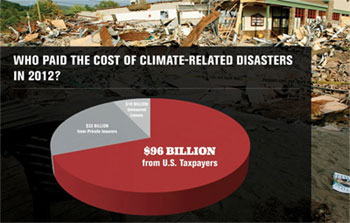In what could be a landmark case, that even spurs the most climate-denying government officials into action, Chicago is being sued by an insurance company for failing to prevent flooding related to climate change, reports ClimateWire.
You may remember that North Carolina’s legislature, for example, prevented government agencies from creating flood maps based on projected future sea level rise, they can only use historical figures.
But this case could change that.
In nine class-action lawsuits, Illinois Farmers Insurance Co. wants dozens of Chicago-area municipalities to reimburse them for claims they paid to flooded homeowners after a 2-day downpour last year.
Illinois Farmers says local officials know that climate change is causing heavier rainfall, yet they aren’t protecting homeowners. They should have drained tunnels and retention basins before the storm, they say. In the lawsuit, they point to Chicago’s Climate Action Plan as evidence that the city is aware of the dangers.
"Farmers is asking to be reimbursed for the claims it paid to homeowners who sometimes saw geysers of sewage ruin basement walls, floors and furniture. The company says it also paid policyholders for lost income, the cost of evacuations and other damages related to declining property values. But some analysts say that Farmers likely has a bigger prize in mind," reports ClimateWire.
The damage was completely preventable, says Farmers, and is filing the case to make sure it doesn’t happen again. At the very least, they could have put out sandbags before the storm hit.
Its parent company, Zurich Insurance Group, could be setting a precedent on how insurance companies will – or won’t – pay for claims related to climate change.
Indeed, insurers covered only 25% of the $139 billion in 2012 for climate-related disasters. Taxpayers contributed $1100 each in what’s become the biggest expense in non-defense discretionary federal spending.

"I guess if you’re an insurer that’s really worried about the scale of liability that you might face from climate change, this would be a pretty smart way to begin to put up some walls around yourself," Andrew Logan, an insurance expert with Ceres, told ClimateWire. "The dollars at stake are much smaller than the precedent that’s being set."
The case might finally spur designers to use forward-looking projections that consider climate change, Wendi Goldsmith of the Bioengineering Group, told ClimateWire.
"If you had the knowledge and you failed to adopt a climate plan, then maybe that opens you up to a different kind of liability," she says.
On the other side, states are pressuring insurers to incorporate risks from climate change into their policies.
Read the full story:
